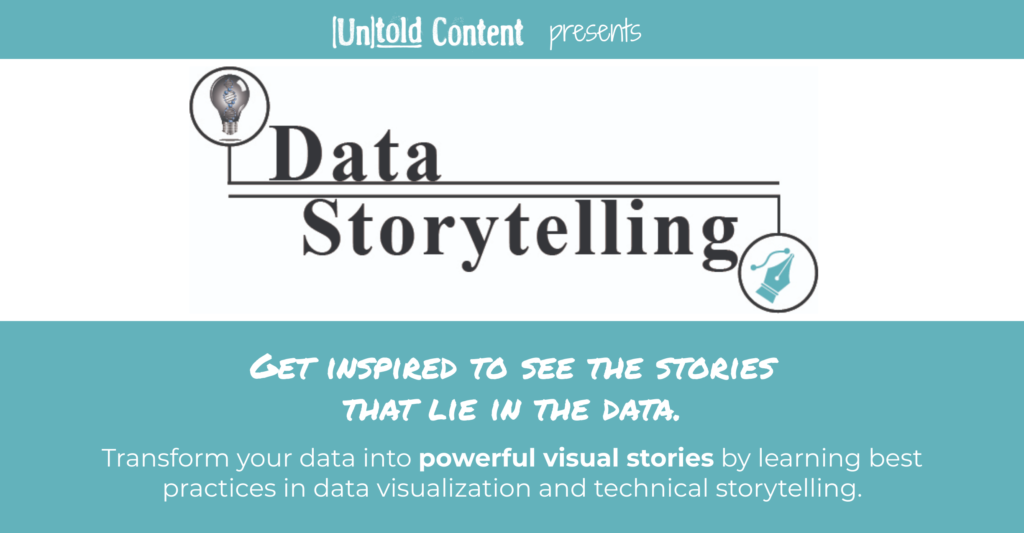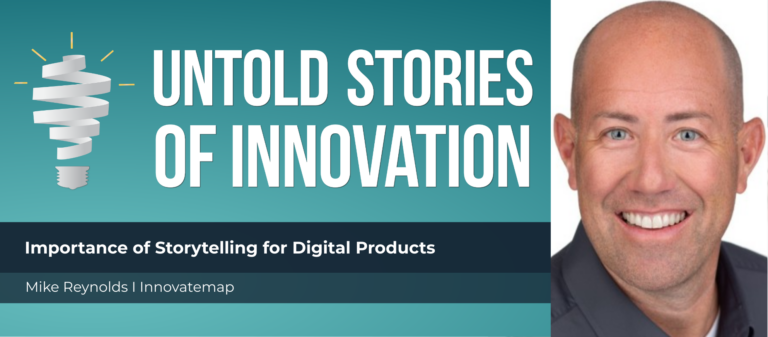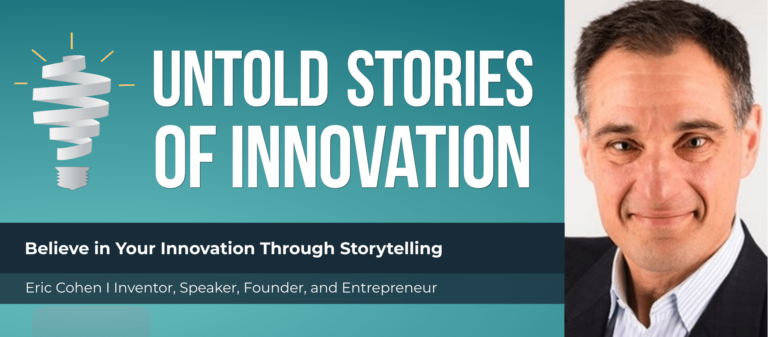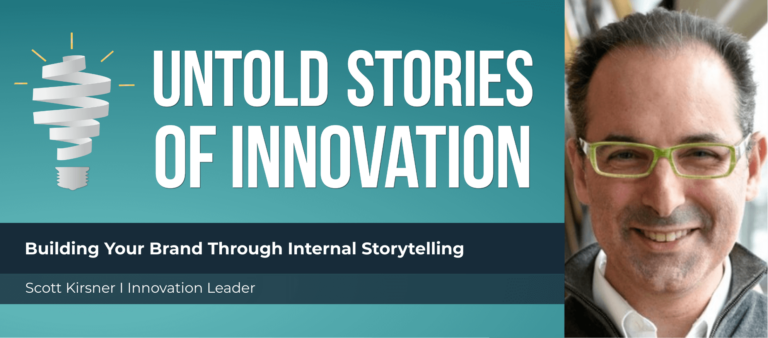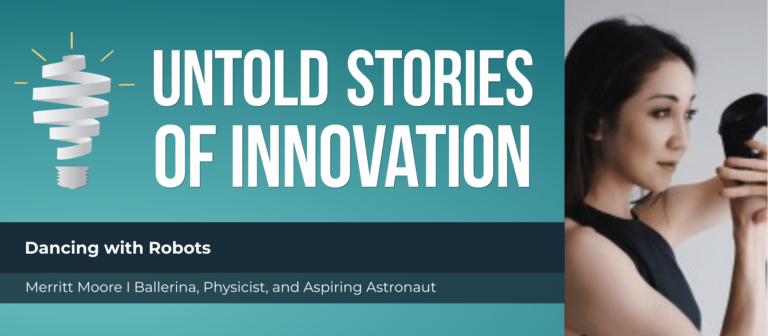Impact Stories Through Storytelling with Tisha Livingston
Untold Stories of Innovation
"It's really important to hone your message and make sure that it speaks to the benefits of your innovation.” -Tisha Livingston is the CEO of Infinite Acres and president at 80 Acres Farms
From today’s episode you’ll learn:
Why do stories matter to the innovation process? What values can be instilled in innovators who share stories? How do innovation leaders inspire creators to tell and share their success and failure stories?
Tisha Livingston is a pioneer in the field of indoor vertical farming. She is the CEO of Infinite Acres, a global joint venture between Priva, Ocado, and 80 Acres Farms that is transforming the global food supply to create a world of delicious, nutritious, and readily available produce for everyone. Prior to forming Infinite Acres, Tisha was the co-founder and President of 80 Acres Farms, where they grow, operate, sell and distribute the freshest vegetables and herbs delivered to supermarkets and restaurants year-round in environmentally controlled, pesticide-free facilities. These two companies have an overwhelmingly positive impact on the environment and food production: they use 97% less water, create more nutrient-dense produce, and aren’t dependent on weather—not to mention the social impact of bringing fresh produce to food deserts. Interestingly, she’s learned that communicating all of these benefits can make the audience question if it’s too good to be true. So, how do you get audiences to buy-in to an idea that seems larger than life? Impactful stories through storytelling that resonate with a specific audience.
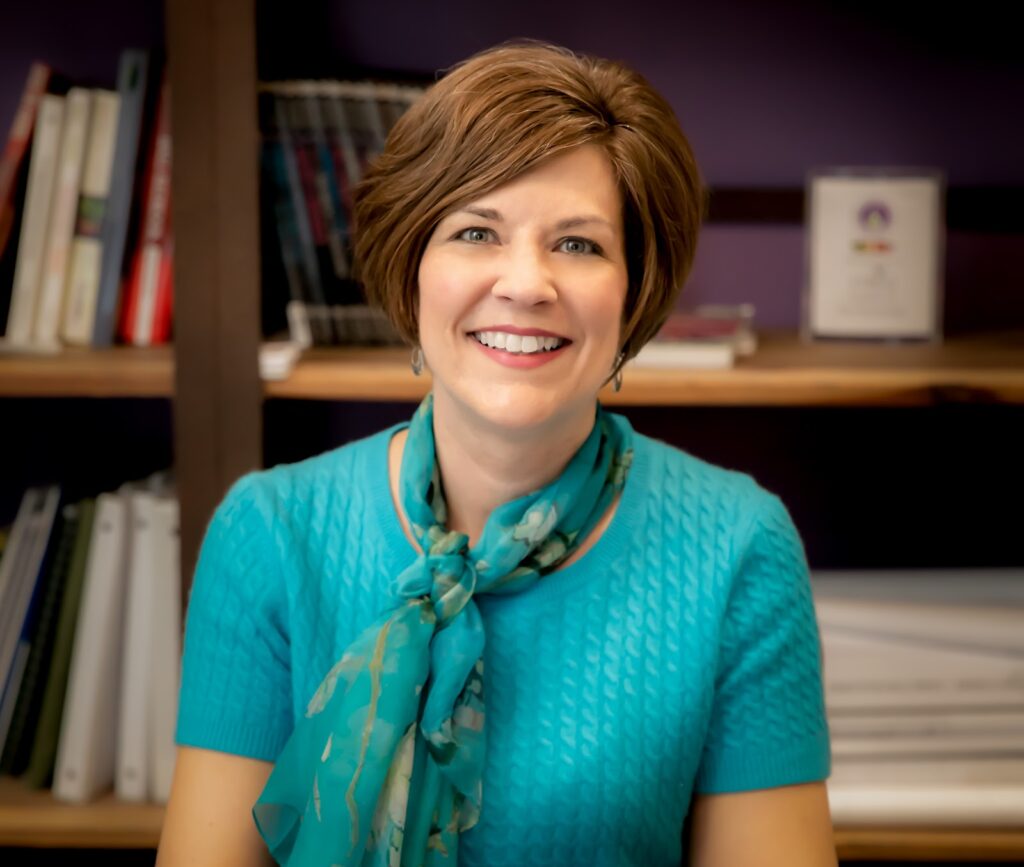
Tisha Livingston is the CEO of Infinite Acres, a global joint venture between the Dutch company Priva, a greenhouse technology company, an American indoor farming company, 80 Acres Farms and the British Ocado Group, U.K.’s largest online grocer. Infinite Acres is a partnership of three companies working together to scale indoor food production through vertical farming done in environmentally controlled, pesticide-free facilities. Prior to forming Infinite Acres, Tisha was the co-founder and President of 80 Acres Farms, a pioneer in the field of vertical farming in the United States, where they grow, operate, sell and distribute the freshest vegetables and herbs delivered to supermarkets and restaurants year round.
untoldcontent.com/trainings/data-storytelling-training
TRANSCRIPT
This episode, Impactful stories through storytelling is powered by data storytelling training from Untold Content and Data+Science. Transform your data into powerful visual stories by learning best practices in data visualization and technical storytelling. Whether you’re a PowerBI or a Tableau person—or just want to better communicate your data—this workshop will inspire you to see the stories that lie in the data. Learn more at https://untoldcontent.com/datastorytellingtraining/.
Katie [00:00:00] Impactful stories through storytelling – Our guest today is Tisha Livingston. She is CEO at Infinite Acres and president at 80 Acres Farms. I’ve had the pleasure of getting to work with Tisha. Our startups were founded at similar times. Tisha, thank you so much for being on the podcast today.
Tisha [00:00:15] Impactful stories through storytelling – Well, thank you so much for including me and letting me be part of it.
Katie [00:00:18] Impactful stories through storytelling – So when we met, you were founding 80 Acres Farms, an indoor agricultural hub. Can you tell us about 80 acres, it’s birth, and now the birth of Infinite Acres?
Tisha [00:00:31] Impactful stories through storytelling – Yeah. So 80 Acres we founded in November of 2015. And my business partner, Mike Zelkind and I, we were really looking for a way to find a solution to our food issues and our supply chain issues related to the food. I don’t know if everyone knows, but the food that we eat travels thousands of miles and tends to be, you know, seven to 14 days old before it even gets to our grocery stores. We recognize that people are really wanting to be able to eat fresh food and they want it to be grown in a sustainable way. They want to know who their growers are. They want to know that there’s no pesticides on their produce and they want to make sure that they have freshness when they bring it home and they have time to be able to consume it and enjoy instead throwing it away. So we decided to scour the world, really. We went all over Asia and then we went all over Europe looking for technology where we could bring fresh produce into the city of Cincinnati. And after we explored a while, we found some great technology partners and we decided to start 80 acres. So we were in the same startup hub with you when we first started. So Mike and I, when we first started, we were in my sunroom and over his garage. And so that was the true, you know, I was like really hardcore startup.
Katie [00:01:57] Impactful stories through storytelling – You are an official garage guru then.
Tisha [00:02:02] Impactful stories through storytelling – I don’t know about guru, but we did officially start in a garage and we thought that was very apropos. But as we started bringing on more and more team members, we recognized that we needed to find some space where we could all kind of meet instead of it just being in my kitchen. So, yeah. So we started 2015. Our first farm that we purchased is on Este Avenue and it was an abandoned warehouse there. And so we found it. It was a perfect size because it was—it’s kind of like the three bears. It wasn’t too big. It wasn’t too small. It was just right. And there is where we started developing our technology to be able to grow produce.
Katie [00:02:43] Impactful stories through storytelling – And I’ve toured that particular site. It’s incredible to see towers of plants essentially growing to the ceiling. Everything indoor.
Tisha [00:02:53] Impactful stories through storytelling – Yeah.
Katie [00:02:54] Impactful stories through storytelling – All of the agriculture being sort of facilitated by sensor technology and water technology. It’s incredibly sustainable. Tell us. Yeah. Could you paint a picture for people? I’m trying to paint it a little bit here, but it’s sort of like—
Tisha [00:03:11] Impactful stories through storytelling – So it’s really about figuring out how to create and control an environment to be able to, I say, unleash the potentials of plants. So we have one system that’s a multi-layer system. So its racks stacked on top of one another. And that’s where we grow lettuce and leafy greens and basil and other herbs. And then we have another room that I think you’re referring to, which is our vine room where we’re growing tomatoes and cucumbers and we’ve grown peppers and eggplants in that room as well. That room is very special to me. That’s where we keep our bumblebees. So they’re the best pollinators. So we have bumblebees flying around in our grow system. So our systems, indoor farming systems, are 100 percent under L.E.D. light and we control the climate. So not only do we control the temperature and the humidity, but the CO2 levels. And we do it with great uniformity, which is really the technology advancement that we have working with our partners that makes what we do really special. And then we also are able to uptake—control the uptake—of water and nutrients that the plants take. And I don’t know if you know, but most plants, they absorb a lot of water, but they only retain about 8 percent of it and create, you know, leaf dry matter that we actually consume. The rest of it they transpire into the air.
Katie [00:04:44] Impactful stories through storytelling – I did not know that.
Tisha [00:04:45] Impactful stories through storytelling – When you’re in, you know, outside, you have to put a lot of water onto the plants. And then when they transpire, it evaporates into the air. Well, because we’re in a completely controlled system, we’re able to capture that evaporation. We’re able to condense it and then we’re able to recirculate it back through. So we use 97 percent less water than you would in traditional farming.
Katie [00:05:08] Impactful stories through storytelling – Wow.
Tisha [00:05:08] Impactful stories through storytelling – So that’s what makes us really sustainable.
Katie [00:05:11] Impactful stories through storytelling – And you also have—so you have this large indoor agriculture facility, but you also sort of have movable, mobile units as well, right?
Tisha [00:05:19] Impactful stories through storytelling – Right. Yeah. And we use shipping containers and that’s what we really started with because we felt like a shipping container was a perfect size to be able to start, to be able to learn how to grow. It’s self-contained. If you screw it up, then, you know, you can start over in a relatively easy way. And then we learned a lot about our lights and our air flow and CO2 levels and seeds and grow media in these small modules. And the good thing about the modules is you can pick them up and you can move them other places. So as we started to grow, we put modules in North Carolina, which is actually where we build most of them. We have them in Cincinnati and then we also have them in Arkansas and we have ’em in Alabama. So you can pick them up and you can—it’s an interesting way to be able to start entering into a market.
Katie [00:06:12] Impactful stories through storytelling – Yeah, absolutely. And I know when we had the honor of collaborating at Untold with 80 Acres, we were supporting grant writing, especially around challenges that society faces such as food deserts and the need for more nutrient-dense produce. And you were solving those problems in such interesting ways by having produce that’s much fresher, much more nutrient and able to be mobile and come into a community. Can you share a little bit about how you came to realize the impacts that were made possible by the technologies and the innovations you were creating?
Tisha [00:06:50] Impactful stories through storytelling – Yeah, I think that when Mike and I first started, we were traveling all over the U.S. We worked for a company called Sager Creek Vegetable Company, and they were a company that unfortunately had gone into bankruptcy. And then they brought us in. That’s what Mike and I did. We worked in food manufacturing. And when there was a company that was in distress, we would come in, we would help try to turn them around and drive improvement.
Katie [00:07:13] Impactful stories through storytelling – So you worked together with Mike before?
Tisha [00:07:15] Impactful stories through storytelling – Yes, Mike and I have worked together for about twelve years.
Katie [00:07:19] Impactful stories through storytelling – Okay. Yeah.
Tisha [00:07:20] Impactful stories through storytelling – And so in this particular job, when we came in—it was a canning company. And because of the bankruptcy and the issues that they had, they didn’t have any contracts with growers and they had sold off all their fields. And so, you know, one of the things that when you’re trying to turn a company around, you have to have a product to be able to sell. And we didn’t have any product to be able to put into a can, because none of the growers were growing green beans and sweet potatoes and white potatoes and corn and all of the things that you think about in canned food. So we had to go travel across the U.S. So we started down in the Gulf of Mexico, in Texas, and we went all the way up to Wisconsin. And we met with every growers that would talk to us because we needed to be able to extend the season. We needed to be able to have them plant some of their fields for us to be able to go into our canning factories. We also went from the panhandle of Florida all the way up to Buffalo, New York, because if you think about growing seasons in the way that our climate warms in the spring and then cools in the summer, you can go up the coast as it gets warmer and then you come back down the coast to be able to—it’s the way to extend the growing season, essentially. So when we met with all these growers, we quickly began to realize that they were struggling. There’s a lot of challenges with growers. Sometimes they have good crop years and sometimes they have bad crop years. And the common theme—and they used a lot of different words to explain what their struggles were. Said sometimes they didn’t have enough heat units. Sometimes it was too much rain, not enough rain. Their soils were depleted, too much pest pressure. But the common denominator is that they couldn’t control their environment. That was the biggest issue. They can’t control Mother Nature.
Katie [00:09:11] Impactful stories through storytelling – Yeah.
[00:09:12] Impactful stories through storytelling – And so we thought there has to be a better way. Besides the fact that we were trucking produce all over the country to be able to go into our one farm—or our one processing facility. So moving all this produce around, there’s a lot left in the fields. There was a lot that was damaged, a lot that was poor quality by the time it got to our farm. And the farmers weren’t really feeling really good about what they were doing either. They were really struggling. So that’s when Mike and I decided that our food supply is pretty fragile and it’s really dependent on weather. And like you had mentioned before, global climate is changing. And there are a lot of issues. You’re seeing severity of weather. You’re seeing crazy temperatures. It was very warm a week ago—we really haven’t had a very hard winter here in Cincinnati. Snowing yesterday, but it was, you know, 60 degrees a couple days before. Plants get confused by that because they need triggers and signs for what Mother Nature is telling them to do, whether they should flower or they should drop their fruit or fruit at all. So it’s very fragile. And we figured that there had to be a better way. There has to be technology out there that’s going to solve our issues. And so we started traveling all over. And when we traveled, we were looking for solutions with technology. And the challenge was we knew about indoor farming. But indoor farming hasn’t been around very long. It’s only been around, you know—really you know, some of the people that are indoor farming that have been out there for 10 years, that’s like a long time. That’s a very long company. So we knew that the technology was advancing, but we weren’t quite there yet. And then we thought, well, what about high tech greenhouses? And we started researching High-Tech Greenhouses. And that’s why we went to Europe. And with high tech greenhouses, what we found is that in Holland, they make perfect sense and they provide almost all the food for Europe. All of the fresh produce for Europe.
Katie [00:11:23] Impactful stories through storytelling – Really?
Tisha [00:11:23] Impactful stories through storytelling – Yeah, this little country. Well, it’s because it’s not a very wide country. It’s right on the sea. All of the greenhouses face in the same direction. And then they get the North Sea, the cool air to go in and cool the greenhouses there. It’s a rather moderate climate. They don’t have tons of sun or you know, but they do get sun. So it’s very easy to not very easy, but it’s pretty easy to be able to grow in a greenhouse there because the climate’s always the same.
Katie [00:11:49] Impactful stories through storytelling – Mm hmm.
Tisha [00:11:50] Impactful stories through storytelling – And you don’t have the spikes. Well when you start looking in the U.S. about greenhouses, if you’re in Ohio, it’s very different than if you’re in Texas. And being able to heat and cool, especially cool a greenhouse, is very expensive and very complicated. And we recognize that we would have to have different configurations of greenhouses depending on the location in the U.S. And it was really our intention to be able to scale indoor farming and have fresh produce in communities all over the U.S., not just one big, massive farm that then we’re trucking from maybe the middle of the country all over, but really have food hubs centers near populations. So we kind of, when we’re exploring the greenhouse angle, we didn’t really think that the technology, the grower community and being able to scale really made sense. So that’s when we came back to indoor farming and started partnering with some of the best in the technology space and collaborating with them to develop indoor farms.
Katie [00:12:51] Impactful stories through storytelling – That’s incredible. So, you know, I’m thinking about getting growers to participate in these movements—in the indoor farming movement—and that vision of you and Mike on the ground talking with growers, understanding their challenges and working with them in a context where they were sort of going a traditional route by sending their produce to canning processors. Now that you’re collaborating with growers to really shape the future of what indoor farms might do, what sorts of stories and, you know, communication do you find yourself sharing with them in order to open their minds to what’s possible?
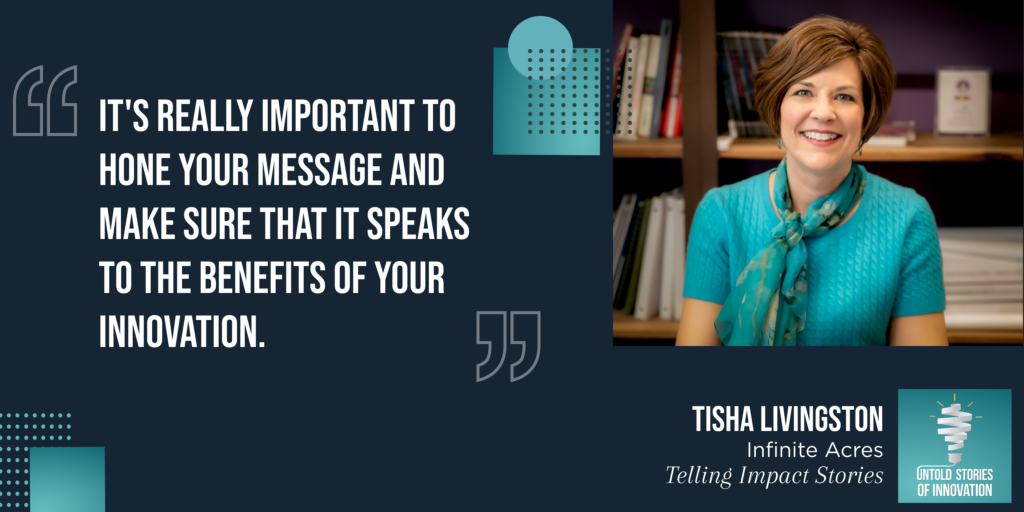
Tisha [00:13:31] Impactful stories through storytelling – Yeah. And I think that many growers are fascinated because they have a curiosity about plants and they have a love for growing things and seeing them succeed. And so some of the growers that we have working at 80 Acres are hardcore growers that were growing outdoors. They were growing in greenhouses. And they really have a love for food production and a love for watching good, healthy crops come up. So—and I think that many of them find it incredibly interesting because we can control all of the variables. So you really can see the potential of a plant and how you can unleash that potential with different stressors. And so what I hear from many of the growers is they get great satisfaction from being able to see the crops grow faster, because typically, you know, our heads of lettuce are growing in 24 to 28 days versus a field grown crop is going to grow 90 to 120 days.
Katie [00:14:35] Impactful stories through storytelling – Wow that’s a big difference.
Tisha [00:14:35] Impactful stories through storytelling – So you get that feedback pretty fast and you can go through a lot of cycles and you can see how one variable or two variables changing really affects the crops. And so they can learn really fast about the impact to the crop. And I think that they’re also able to grow a wider variety of crops than they possibly would be able to in a conventional way. One of the ways that we’re using storytelling to talk about our technology is we have had the most incredible opportunity to partner with REM Koolhaas at an exhibition at the Guggenheim on Fifth Avenue in New York. And so they reached out to us and they said we would like to talk about the countryside and we’d like to talk about the implications of food production. Countryside technology and how that all intersects comparing it to the cities. And he said, we’ve been to your module. We’d love to have something at the Guggenheim. And I said, I’d love to be able to grow tomatoes on Fifth Avenue.
Katie [00:15:43] Impactful stories through storytelling – Right.
Tisha [00:15:44] Impactful stories through storytelling – So right now we’re growing tomatoes on Fifth Avenue. Were there till August. And it’s starting a conversation.
Katie [00:15:51] Impactful stories through storytelling – Right.
Tisha [00:15:51] Impactful stories through storytelling – When you think about storytelling and you think about what can be with technology. Then it’s starting a—it’s already starting a conversation. You wouldn’t believe the number of people that just walk up to us off of the street and they say, we have to bring our kids here. We want kids to come. We want everybody to see how food is really produced and talking about how you can produce it in a city instead of shipping it, you know, thousands of miles. So it’s a tangible example of exciting storytelling that we’re doing right now.
Katie [00:16:24] Impactful stories through storytelling – I love that so much. It’s really neat. Is it a pod that is sort of inside the Guggenheim?
Tisha [00:16:30] Impactful stories through storytelling – No.
Katie [00:16:30] Impactful stories through storytelling – Or is it on the street?
Tisha [00:16:31] Impactful stories through storytelling – It’s on the street. It’s on Fifth Avenue. I was there last week. It is traffic stopping.
Katie [00:16:36] Impactful stories through storytelling – What does it look like?
Tisha [00:16:37] Impactful stories through storytelling – Well, it is–it looks kind of like giant shipping containers. It would be four shipping containers. So two stacked on top of one another. So it’s about 15 feet tall and about 20 feet wide. And it looks like it has, you know, it’s prefabricated walls and it has giant windows in the front. So you can see the purple light shining through right into the park. And you can see the plants growing. We have our grower, David, is there making sure that the crop is being cared for. We’re going to have tomatoes that are going to be growing in the next–in the next 45 days, we’ll have tomatoes and we’re going to first give some of the tomatoes to the restaurant and the Guggenheim so you can eat them, of course, we’re going to share tons of tomatoes with people on the street. And then we’re giving the rest to City Harvest.
Katie [00:17:32] Impactful stories through storytelling – Wow. That’s incredible. So really partnership in so many different ways is really elevating your mission.
Tisha [00:17:40] Impactful stories through storytelling – Yeah. The Guggenheim has been a wonderful—
Katie [00:17:42] Impactful stories through storytelling – And they just reached out?
Tisha [00:17:44] Impactful stories through storytelling – They did. Well, yeah. It was Rem and OMA that reached out to us and said, this is an exhibition I’ve been—he’s been working on for ten years and he’s been working closely with the Guggenheim for the past couple years. And it was just a tremendous experience. And to be able to hear his story about how the countryside is changing in the things that he’s seen through his travels and what concerns him about, you know, the permafrost melting and the polar ice caps and how the countryside is changing is—it’s fascinating. So it is—and the Guggenheim is a perfect place to tell stories, because if you think about it, those that haven’t been to the Guggenheim, it’s circular. It’s a ramp. And you go—you start at the bottom and you’re starting to think about the history of the countryside and what the countryside meant to people thousands of years ago. And then as you’re going up the ramp, it’s six levels, I think. When you get to the top, it’s all about the High-Tech technology that is helping kind of bring the countryside back in food production and so it’s just a wonderful way to be able to tell a story in a very circular way. And so anybody that’s looking for storytelling about the countryside and the evolution of the countryside should go.
Katie [00:19:03] Impactful stories through storytelling – That’s really neat. Wow. Thank you so much for sharing that. So is there a place? Is there a website or like a hashtag people can follow to see that?
Tisha [00:19:12] Impactful stories through storytelling – Yeah, well, absolutely. You can go out to our 80 Acres Farms website to get information about it, or you can go to infinite-acres.com is the infinite website. You can also go out to the Guggenheim and see it. And so we’re in the process of probably getting a camera in there so people can see the plant growth as they’re doing it.
Katie [00:19:36] Impactful stories through storytelling – That would be amazing.
Tisha [00:19:37] Impactful stories through storytelling – And some reaction. The thing that I think is fun is seeing the reaction of the people as they’re walking down the street and understanding, you know, the questions that they’re asking. And so it’s an exciting time.
Katie [00:19:50] Impactful stories through storytelling – Wow. Thank you for sharing that. It’s a really powerful example of innovation storytelling and making that accessible to all.
Tisha [00:19:56] Impactful stories through storytelling – Yeah. Anybody that’s walking past the Guggenheim.
Katie [00:20:01] Impactful stories through storytelling – So there’s so much vulnerability to the life of a grower and, in a lot of ways, bringing them in as partners and allowing them to have the space they need to experiment and feel some sense of control. Yeah, it sounds like this is a really exciting new innovation for that world in particular.
Tisha [00:20:22] Impactful stories through storytelling – Absolutely. And the other thing, too, is that, you know, growers are people of nature. They like to see things grow and they understand that our current methods of farming are not sustainable. And they do the very best they can with the resources they’re given but being able to grow in such a way where you really are sustainable and you’re really using a lot less of the natural resources and you’re using them in an efficient way is something that’s really appealing. And one of the one of the growers that we have, she always says that she loves coming to 80 Acres Farms because she feels like she’s using less and growing more every day.
Katie [00:21:07] Impactful stories through storytelling – Wow.
Tisha [00:21:08] Impactful stories through storytelling – Being able to use less water, less nutrients, less energy and being able to get more and more output.
Katie [00:21:15] Impactful stories through storytelling – That’s incredible. Can you put your entrepreneur hat on for a minute and tell me about the role that storytelling has played as you work to get buy-in from, you know—we’ve talked about growers, but also other partners, investors, you know, just the world of really growing a startup and scaling it the way that you have is incredibly impressive. And I think you’ve harnessed the power of story really well in that. Can you share some insights?
Tisha [00:21:42] Impactful stories through storytelling – Yeah. Thank you. So, you know, we Mike and I, we like to be able to tell our story and explain to people. It’s very concrete if you say—like when I told you the story of the growers and how we’ve been out and we’ve spent so much time with growers and understanding their struggles. That’s a concrete example that we can explain. We can talk about sustainability and, you know, all of the high-level benefits of indoor farming. But when it’s really tangible and you can say, you know, I’ve talked to people, I’ve seen their struggles, they’ve shared with me their struggles. And then these are solutions that can help alleviate some of those struggles, I think is really powerful. The other method or reason why we believe in storytelling is it really conveys the foundation of our culture, the infrastructure, the fiber of our culture, why we are doing what we’re doing, what’s important to us as an organization and especially as founders, why we did it, because as we’re growing—we are growing very fast at 80 Acres. We have 125 people now.
Katie [00:22:58] Impactful stories through storytelling – That’s incredible. We met about three years ago. And I remember it. Maybe there were eight people on your team at the time.
Tisha [00:23:04] Impactful stories through storytelling – That’s right.
Katie [00:23:05] Impactful stories through storytelling – We were sharing some of the same conference rooms in our Internet startup hub in Cincinnati. Shout out to Cintrifuse and Union Hall, where a lot of these things start and are born. But absolutely so. So over a hundred, that’s amazing.
Tisha [00:23:18] Impactful stories through storytelling – Yes. We’re at about 125 people now. And as we grow, Mike and I don’t have the opportunity to touch as many people as we used to. We were, you know, sitting across the table. We’re all huddled in the same conference rooms. And now, you know, we have a joint venture that’s based out of Europe. So I’m spending half my time in Europe, half my time in the U.S.
Katie [00:23:42] Impactful stories through storytelling – And that’s Infinite Acres?
Tisha [00:23:42] Impactful stories through storytelling – That’s Infinite.
Katie [00:23:44] Impactful stories through storytelling – We’ll talk about that.
Tisha [00:23:44] Impactful stories through storytelling – Yeah.
Katie [00:23:45] Impactful stories through storytelling – Yeah. I want to hear more about Infinite.
Tisha [00:23:47] Yeah. So but being able to tell stories and continue to pass our stories along, it’s the history of our company just like you tell the history of your family. It’s very personal and people can relate to it and then people can get behind what you stand for because it’s not just a job. We’re not hiring employees. We’re hiring partners that want to make a difference. And it’s really important to Mike and I that we’re telling stories. One of my stories that I go back to, to remember our roots and remember where we came from—Samantha, who was one of our first growers. When we first started, we had two containers and they were on the lot it at Este and we were under construction at Este. And everything was a big mud pit because we didn’t have asphalt down yet. We didn’t have anything. We just had these two containers and we didn’t even have water. So we were bringing in jugs of water to be able to grow these plants because we had to learn and we had to start, you know, sharing it with our potential restaurants and retailers and understand what people want. And I remember it was so cold. It was in the wintertime and she and I were standing in the parking lot, drinking coffee and dreaming about the future. Thinking about what we’re doing now and dreaming about where we’ll be in a year and where we’ll be in two years. And I hearken back to that, because I think when I think about how far we’ve come in such a short period of time, I couldn’t—we couldn’t dream it big enough to where we’ve ended up. But it always reminds me of us being in the mud pit with our two containers in our cup of coffee and, you know, no bathrooms and, you know, just trying to bring in bottles of water. And I think that’s what we were founded on. We were founded on hard work and knowing that we have this dream of something bigger and better and we really want to make an impact. And we weren’t afraid to just get dirty and get in there and figure it out.
Katie [00:25:52] I think there’s so much to kind of learn from that story as you share it, to create a culture of partners, as you say, your employees, to make them passionate about what you’re doing to help them see and really be sort of blown away by what’s possible and to really be able to embrace change, too. That’s a beautiful image. I think every innovator listening to this podcast has had a moment where you’ve been standing in a mud pit, dreaming, dreaming about the future, trying to see what it might look like. What could be.
Tisha [00:26:28] Yeah.
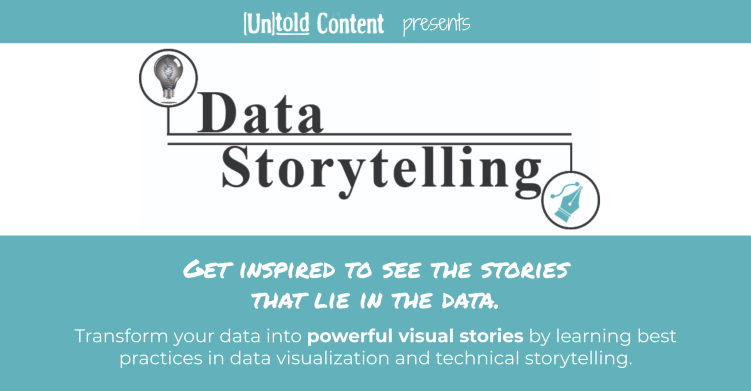
Katie [00:26:29] So I love that image. Thanks for sharing that.
Tisha [00:26:31] My pleasure. It’s one of my favorite thoughts. And Samantha and I still talk about it because then now I’m like, okay,]what’s our next mud pit? Well, okay. So now we have another mud pit and it’s called our 70k building in Hamilton. We’re building a gigantic farm. And so it is a mud pit as well, because we’re in the middle of construction. And there’s something about mud in a soilless indoor farming solution. But when we broke ground there and we had our groundbreaking ceremony, the whole team was there. And there’s a picture of us and it’s raining and we’re all there. I think half of us lost our shoes in the mud because we decided that we wanted to go out into the site. And so. Yeah. So mud and in cold, rainy weather has played—
Katie [00:27:17] That is pretty ironic for a soilless, indoor agricultural set up.
Tisha [00:27:24] Yeah.
Katie [00:27:26] I love that image. Okay. So then out of the growth of 80 acres came Infinite Acres. So you have to catch me up. It’s been maybe a year or so since we’ve chatted about this.
Tisha [00:27:36] Yeah. So it’s exciting. So when we think about what Mike and I have built with our team since 2015, we had the opportunity to meet some of the most amazing people. And through this process, because, you know, the industry’s really small in indoor farming. There aren’t a lot of people out there and everybody’s struggling to try to figure out how to really scale it, how to make money at it as a business. And Mike and I quickly realized that there are people out there in the industry, in the horticulture industry and automation and manufacturing that will know—will forget more than we could possibly learn. And we recognize that there is so much to do. There are so many challenges out there that you have to conquer when you’re looking at a new industry. We couldn’t do it alone or we could do it alone, but it would take too long and it would take a lot of money and it would take a lot of effort. And why would you do that when there’s so many great people out there that want to share? They want to share their stories. They want to share their trials and tribulations and many of those trials and tribulations we’ve done together. So I mentioned that we were building that farm at Este. While we were building it with a company called Priva. And Priva is a premier water and building control system company. They’ve been around for 60 years based out of the Netherlands. And many of the commercial greenhouses and greenhouse installations across Europe and even in North America have their stuff in it, have their water systems and their building control systems. So as we were working together with them, you know, we had a lot of struggles. We had a lot of struggles when we first started our farm. It had never been done before.
Katie [00:29:21] Right.
Tisha [00:29:21] And we killed a lot of plants and Priva, helped us kill a lot of plants together. And there was a point at which, you know, it was such a struggle. And there’s a lot of pressure to perform. And we had a very honest conversation with Priva and we said, do you—we think that we should just part ways and we’re going to figure out how to do this on our own. And they said, we want to be your partner. We think that it’s really important. We want to figure out how to do this together. And so we decided, rather than breaking up, that we would do it together because 80 Acres understands manufacturing operations, merchandising, how to get produce in front of the retailer in the food service provider. Mike and I have 25 years of experience in the food industry. Priva really understands plants and they really understand climate and what it needs to grow them. So rather than us going and innovating on our own and figuring all that out, and them trying to figure out how to merchandise it and how to turn it into a business, we decided that we would do it together. And so after that, we formed Infinite Acres. So it was a joint venture between the two of us to start with. But then there was another company that came along and they said, well, we want to get into indoor farming. And, you know, when Priva and 80 Acres first started, we started mapping out everything that you need to be able to have an indoor farm. You need to have, you know, a lighting solution where you understand the impact. You have to be able to understand the crop science and the seeds. And you need to understand automation and you need to be able to build the building and run manufacturing. And, you know, you need to be able to do all the data collection. And we started honestly assessing where we’re really good, where we have great technology and where we need help. And so Ocado is—it’s the world’s largest grocery retailer online. So grocery retailer and they’re based out of the U.K. They’re a fabulous, fabulous company, very innovative. And they get moving stuff. They understand how to move stuff in a very highly efficient manner. And they have the absolute best predictive analytics. So they can get groceries to you in London traffic and, you know, get it on time in an hour.
Katie [00:31:39] Wow.
Tisha [00:31:40] So they’re an amazing company. So they wanted to partner with us. So what we did is we said, well, there’s always room for more. Right. Because we didn’t really have a solution there yet.
Katie [00:31:49] Right.
Tisha [00:31:49] And so we needed people that understood predictive analytics. And we can understand moving things, moving automation. And so we brought them on. And then we have another partner that wanted to come on just as a supplier partner, which is Signify. They’re the lighting company. And then we have seed companies that want to come on. So what started out as a great story of two companies that were struggling to figure out how to work together, deciding, OK, no matter how hard it is, it’s kind of like a marriage, you know, no matter how hard, we’re going to stick it out. We’re going to figure out how to make it work and we’re going to like it. We have all these companies that want to come together with us and they want to collaborate because we recognize it’s too big for any one company to really do it. If we want to take this industry and mature it and advance it, we need to be able to collaborate with the best people and then innovate in the gaps because, you know, identify where everybody’s really good, where they play and where they’re contributing and then figure out what else you need. And that’s a very pointed innovation for us. So that’s Infinite Acres. And I’m—I have the distinct pleasure and honor to be the CEO of that company.
Katie [00:33:01] Tell us about some of the current projects or efforts or initiatives happening at Infinite.
Tisha [00:33:06] Okay. So we have so many things, so it’s so crazy. The first farm that we’re building is in Hamilton and it’s for 80 Acres. And it’s what we call it the 70k. It’s 70000 square feet. Anybody here in Cincinnati go drive through the Enterprise Park and you’ll see this big structure that’s being put up right now. And we’re calling that our reference design because we believe that to be able to innovate and then scale, it’s really important to have a standard. And that is our standard by which we’re going to take it globally. So we have a project in Shanghai that we’re also working on that about two or three months after we finish the reference design, which will be late summer, we’ll finish the farm in Shanghai. And then we have intentions to build a farm with 80 Acres at another company in the Scandinavian region. We have two projects in Canada that we’re working on. Plus, we have another project on the Atlantic Coast. And so we have about five or six projects that we’re working on actively right now, big projects, that will help us see the technology and innovation of the reference design through and scale. So we are very busy on projects. 80 Acres is a tremendous support and great partner with us. And then we’re also continuing to innovate because you know what you have now is the best that we can do. But we know there’s so much more innovation out there that we need to do. And we’re really relying on our partners at Priva, of our partners at Ocado and 80 Acres to continue driving that innovation forward.
Katie [00:34:51] Absolutely. It’s such an important lesson for interdisciplinary innovation, not being afraid or thinking—I don’t think that organizations have the luxury anymore of working in pure isolation. Even the largest, most established enterprises are setting up venture programs and trying to scout the best startup ideas and talent or taking a completely open innovation pathway where they’re trying to crowdsource the best ideas too. So I love that as an example of interdisciplinary, cross-functional collaboration, not looking at the other players as competitors, but seeing how might we do this together? What might be possible if we can kind of harness all of our talents and all of our resources?
Tisha [00:35:36] Yeah, I believe that in indoor farming—and really when you think about the way that we grow food, food production, and the challenges we have around food production, we don’t have the luxury of time and the luxury or the ego to figure it all out on our own. The time—the clock is ticking. You know, you have droughts in California, you have droughts everywhere else. You have flooding. We’re diminishing our natural resources. We have to have a solution and we can’t let our egos get in the way. It’s really important to be able to collaborate with the best to be able to push this industry forward. There’s so much to offer in this industry.
Katie [00:36:16] So much of the innovation stories coming out of Infinite Acres and 80 Acres in my mind—it speaks so powerfully to impact. And Impact is one of the five drivers that our team at Untold has identified in terms of what makes for a powerful innovation story. So impact on sustainability, impact on food, and people’s access and hunger and the challenges around hunger and food deserts and isolation. There’s so many different impacts that you’re able to achieve thanks to moving technologies in this direction. And at the same time, I would imagine any highly innovative organization like yours faces a challenge of helping society see that this is a valid and strong path forward. So can you share some of the ways in which you’re able to communicate your efforts and kind of help people overcome that challenge of not necessarily knowing for sure that’s—maybe being a little bit wary of that future?
Tisha [00:37:21] And that’s a challenge. And I think with many innovators being able to communicate the story and the impact, and there’s so many positive, amazing things that indoor farming can provide. How do you narrow it and how do you narrow the message and how do you make sure? Because, you know, if I talk about sustainability and I talk about the fresh produce and then I talk about the health and nutrition and being able to provide the right nutrients where there’s nutrient gaps in people’s diet, you know, after the first couple, you’re like, oh, yeah, that’s great. You know, that’s amazing. That’s exactly what we want to do.
Katie [00:37:59] Impact overload?
Tisha [00:38:00] Exactly. That’s exactly right. And then you talk about the next three or four and they’re like, okay, we get it.
Katie [00:38:06] But there’s water conservation, too.
Tisha [00:38:06] And then you start talking about the 10th and 11th and 12th, then like, okay, we get it. This might be too good to be true.
Katie [00:38:12] Oh, it’s interesting. So almost too much impact in your innovation story can start to raise red flags or make people—
Tisha [00:38:17] I think it diminishes the story.
Katie [00:38:19] Isn’t that wild.
Tisha [00:38:19] Yeah. And I think that it—people are wary of that, they’re like, you know, I don’t really know. It sounds too good to be true. And so for us, it’s all about making sure that we are honing in on the right message for the right audience.
Katie [00:38:34] Right.
Tisha [00:38:34] And when we’re telling stories and we’re talking—what’s important to them. So when I’m talking to a retailer, what’s important to that retailer, what’s important to the customer that is looking to buy our produce versus the consumer vs. society and governments. And so it’s really—
Katie [00:38:53] And all the regulatory bodies I’m sure you’re having to collaborate with, too.
Tisha [00:38:57] Exactly. And so it can’t be a one size fits all and catering our storytelling and honing our message and being really clear with the message, I think is the most important thing that we can do.
Katie [00:39:09] That’s a great problem to have though.
Tisha [00:39:12] I know.
Katie [00:39:12] Impact overload is our problem.
Tisha [00:39:15] I know.
Katie [00:39:16] So I do envision, though, a really great, you know, explainer video where you could kind of play on that in a fun way to sort of show like this and this. OK. We’ve probably exhausted you, but we promise all of this is true. What matters most is which of these things you care most about.
Tisha [00:39:33] Actually.
Katie [00:39:34] That’s funny.
Tisha [00:39:34] Exactly. Yeah. So that’s—when we think about our branding to our consumer, it’s very different than what the customer wants. And so. Yeah. But impact overload. I like that.
Katie [00:39:45] I do, too. That’s the first time that’s come up in these podcast interviews. So we’ll have to add that to our training experiences for innovation storytelling. We are in an amazing space where we can do amazing things. Yes, that’s right. So what advice do you have for innovators like yourself, if you can think back to four years ago? What advice do you have to people today who have a powerful idea, whether they’re working in a large enterprise organization or they are wanting to create their own startup? What advice do you have, especially around how to harness the power of story to get buy-in for their ideas?
Tisha [00:40:22] Yeah, I think that it’s really important to hone your message and make sure that the message that you have speaks to the benefits of what you’re wanting to innovate on. And then you have to think about great stories and storytelling, because as innovators, our trap, in my opinion, is that we get so excited about particularly technology, you get so excited about the tech, you get so excited about the science, you get excited about the impact that you forget and you go really, really deep. And then I start talking to you about photosynthetic rate and about efficiency and about this and that. Yeah. And nutrient, you know, the nutrients required in the different formulas and recipes and you’re like, wow, I just want to know what time it was. You know, it’s like I did, you know, I didn’t want all that. And the message gets lost. And so I think really being able—storytelling is a way to be able to tell the story to others that aren’t as enthused and bought into your idea. And then I think it makes it into a bite size piece so that you can get good feedback, because if you go too deep and too technical, then the average person isn’t really going to be able to provide the kind of feedback that you’re needing and looking for. And when you’re starting out and you’re starting on these ideas and it’s in your head and you’re trying to figure out how to do it, you really need collaboration from a lot of people. You need a lot of different voices coming from a lot of different places. Now, some of my best consumer insights are from my mom. And, you know, when I’m talking about, you know what is impactful to a consumer? So if I start talking to her about photosynthesis and how we can grow faster and, you know, cheaper, blah, blah, blah, it’s not going to matter to her. But the fact that it’s pesticide free and that we picked it, you know, hours, not days or weeks before she gets it. Those are things that are important to her. So being able to share your story at the right level is really important. And innovators you get so excited about. It’s so hard to kind of stay the right level to really gain that and garner that feedback.
Katie [00:42:39] I love that advice. We talk a lot about evidence burden and, you know, the burden of having too much data and too many statistics and how that can really result in eyes glazing over.
Tisha [00:42:49] Yes.
Katie [00:42:50] But I think we haven’t talked enough, I think, on this podcast about the impact overload and how to really refine it. It’s not that you can’t know all of those talking points or know what all of those impacts are. It’s about being selective and tailoring, not aligning it with the audience or the stakeholder you’re communicating with. And I love that advice, too, about trying to make it bite sizable. That way you can test it and get feedback on that particular piece of impact or evidence that you’re sharing.
Tisha [00:43:22] Yeah. You can always go deeper. But it’s really hard to get your audience back after you’ve gone too deep.
Katie [00:43:30] That’s fair. Wonderful. I’m so grateful to have this conversation with you. Thank you for being on the podcast today. I’m so excited to see how Infinite Acres grows and how 80 Acres continues to succeed. So thank you for taking the time.
Tisha [00:43:43] Well, thank you so much. And thank you for everything you’re doing, because I think really storytelling and innovation and kind of helping us think about how we communicate is very important. So thank you so much for everything you’re doing. I appreciate it.
Katie: Thanks for listening to this week’s episode. Be sure to follow us on social media and add your voice to the conversation. You can find us at Untold Content.
You can listen to more episodes of Untold Stories of Innovation Podcast.
*Interviews are not endorsements of individuals or businesses.

